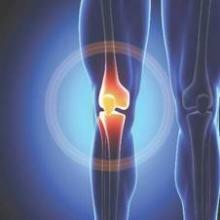Accounting for missing data revealed functional declines over time in patients with newly diagnosed knee osteoarthritis, according to researchers.
The findings contradict more optimistic results from other longitudinal studies of knee OA, said Britt Elin Øiestad, Ph.D., of Oslo and Akershus University College of Applied Sciences and her associates. “The adjusted analyses showed either stable or worsening physical function, which is more in line with what is observed in the clinic,” the investigators said.
Their analysis included data from 802 participants in either the Multicenter Osteoarthritis Study (MOST) or the Osteoarthritis Initiative (OAI) who developed symptomatic knee OA during the course of the studies.
Approximately two-thirds of affected patients were women. Patients averaged about 63-66 years of age, had average body mass index of about 30-31 kg/m2, and had not undergone total knee replacement surgery at baseline or total hip replacement at any time. The researchers used a multiple imputation method to account for missing physician visits and a local regression smoothing curve to predict clinical status just prior to total knee replacement surgery (Arthritis Care Res. 2015 Aug 3. doi: 10.1002/acr.22674). Patients in MOST who developed knee OA showed no significant change over 4 years in scores on the Western Ontario and McMaster Universities Osteoarthritis Index (WOMAC) Physical Function (pf) subscale, while their Five Times Sit to Stand Test and 20-Meter Walk Test results rose by 1.5 seconds over 5-6 years (P less than .003), the investigators said. Adjusted results from OAI were similar, revealing significant worsening over time in WOMAC-pf and 20-Meter Walk Test results. “In crude results in which we did not impute missing values or pre–total knee replacement physical function status, the trajectory of physical function was more favorable,” the researchers added. “We found that imputing missing values and predicting pre–total knee replacement function reduced some of the bias seen in the unadjusted analyses, which incorrectly suggested improvement in physical function in people with knee osteoarthritis.”
The Research Council of Norway and the National Institutes of Health funded the study. The authors did not report funding sources or conflicts of interest.


